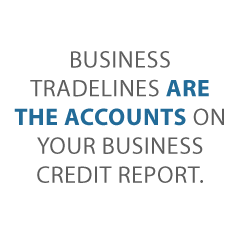Business tradelines are the accounts on your business credit report. We are going to tell you everything you need to know about why you need them, how to get them, and how to use them to build strong business credit.
This blog post may contain affiliate links, meaning when you click the links for some products and make a purchase, Credit Suite receives a commission at no additional cost to you.
5 Things You Need to Know About Business Tradelines … and How to Get Business Tradelines Without Already Having Business Credit
Business tradelines, and terms like it, are thrown around in the business world with the assumption that everyone knows what they mean. However, these assumptions can cause problems when they are wrong. Then you run into issues with people using terms in ways they are not meant to be, to mean things they do not really mean. As you can imagine, it can cause a lot of confusion.
Our goal is to clear up that confusion. We intend to lay out for you exactly what tradelines are, why you needed them, and what you don’t know about them that you definitely need to know.

Credit Strong® is a Business Credit Builder Loan. Basically you loan yourself money and they report it.
What Are Tradelines for Business Credit?
The term in question, business tradelines, simply refers to accounts that report your payments to the business credit reporting agencies, or CRAs. That could be vendor accounts, business credit cards, or a select few other things. Most often the term refers to vendor accounts.
You buy stuff from these vendors, and they allow you to pay them at a later date. We call this net terms. It is different than revolving credit, because you have to pay the whole balance by a certain date.
That means they will bill you for the goods or services you buy from them, with the understanding you will pay within a certain amount of time. Most often, it is 30 days, or net 30 terms. Occasionally they will extend net 60 or net 90 terms. (Again, make sure that your net 30 accounts report to the business credit reporting agencies like Dun and Bradstreet.)
If you know anything about tradelines, that is likely the extent of it. Now, here is what you don’t know.
5 Things You MUST Know About Business Tradelines That You Probably Don’t Know Already
This is the information that can get confused from source to source. We’re going to clear it up for you.
1. Not all Business Tradelines are Good for Building Business Credit
Tradelines are only good for building business credit if they report your payments to the business credit reporting agencies, or CRAs. These include Dun & Bradstreet, Experian, and Equifax. There are a few others as well, but these are the big three.
The thing is, not all of them do report payments. They are not required to do so, and many do not. You have to find those vendors that will report your payments if you are going to use them to build business credit.
2. Buying Business Tradelines is a Bad Idea
Since it can seem almost impossible get a trade credit line without credit, someone somewhere at sometime had the idea to create companies, use them to obtain tradelines, then sell the tradelines to those who wanted fast business credit.
Essentially, these are shelf companies that have years’ worth of seasoned tradelines. They market to new business owners as a way to access funding they would not otherwise qualify for. It sounds great. You pay a lot, but you get the potential access to so much more.
The truth is however, that lenders are not dumb. They caught on to this ruse quickly, and though it is not technically illegal, it is very much frowned upon. If a lender catches wind of the idea that you may be using business credit that you did not actually build yourself, you could be blackballed.
That means, not only would you not be able to get funding based on the credit you purchased, but it would block you every time you try to build credit on your own.
3. You Can Get Business Tradelines without Already Having Business Credit
 This is the little-known secret to building business credit that you have been looking for. If you start with vendors in the vendor credit tier, known as starter vendors, you can get tradelines without having business credit at all.
This is the little-known secret to building business credit that you have been looking for. If you start with vendors in the vendor credit tier, known as starter vendors, you can get tradelines without having business credit at all.
When they start reporting the CRAs, your credit will start to grow on its own without you having to spend a dime other than what you buy from the tradeline vendors that your business needs anyway.
Once you have enough business tradelines reporting from these starter vendors, your credit should be strong enough to start applying for credit cards in the other credit tiers. As you gather more accounts in each tier, you will be able to move on to the next tier.
4. You Need to Get Business Trade Lines in a Specific Order
I touched on this above. If you are using business tradelines to build business credit, you can’t just start applying for business credit cards right away. They will deny you every single time. You have to start with establishing tradelines with those starter vendors in the vendor credit tier.
5. Too Many or Too Few Trade Credit Lines Reporting Can Affect Your Business Credit Score
The problem with this is, the CRAs are pretty tight lipped on where the sweet spot is. That said, your best bet is to open only as many accounts in each tier as you need to move on to the next. Then, only close accounts if you absolutely must.
One thing we do know is that Dun & Bradstreet requires at least three tradelines reporting before it will even calculate a Paydex, which is the score lenders most commonly use. It is the most like the personal FICO score.

Credit Strong® is a Business Credit Builder Loan. Basically you loan yourself money and they report it.
3 Tips to Establishing Initial Business Tradelines Without Established Business Credit
Along with the Vendor credit tier, which I will talk more about below, there are a couple of other options for getting initial business tradelines reporting your payments.
Ask Bills to Report
You pay things like utilities, rent, telephone, and internet each month already. These companies do not have to report to the CRAs, but some will. You’ll have to ask, but the worst they can say is no.
Work with Current Vendor Relationships
If you have been in business long enough to have vendors that you already have a good relationship with, use that to your advantage. Open a discussion about net terms on invoices and see what they will offer. You may be able to get some tradelines reporting without a credit check that way, and build to the next tier faster.
Vendor Credit
In addition to these options, vendor credit with starter vendors is the best way to get started when it comes to building business credit. Some vendors will extend net terms and report payments, without doing a credit check. Instead, they will rely on length of time in business, income, and other factors to determine eligibility. The problem is, it’s not easy to find starter vendors.
Be Sure Business Tradelines are Reporting to Your Business Credit
It isn’t a given that these tradelines will report to your business credit. You have to have to business set up properly for that to happen. What does that mean? It means setting up your business as a separate, fundable entity. When lenders look at the business, they need to see an entity that stands alone, separate from you as the owner.

Credit Strong® is a Business Credit Builder Loan. Basically you loan yourself money and they report it.
Going Forward: Business Credit Monitoring
After you have business trade lines reporting to the business CRAs, be sure you keep an eye on your reports. So, they will likely not show the name of the companies reporting, only the types of companies. That means you need to keep track of your accounts and match them up so you know who is reporting what.
You will also want to watch for any mistakes and get them corrected. We can help you monitor your business credit on a regular basis here.

